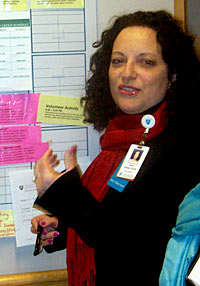The Most Important Conversation

“...it’s not about me, it’s about what’s best for dad, it’s about
what’s best for my mother who’s still alive and actually older than my
father—it’s what’s best for the family." Marie Sweeny
Marie Sweeny wants what is best for her aging mother and dying father. Her father, Sal, is 80-years-old and suffering from heart failure and advanced dementia. He cannot talk and is barely conscious. But making the decision to stop life-prolonging treatment has been torturous for Marie, as it is for many adult children in her position.
Studies show that when patients and their loved ones discuss end of life issues early on, the patients are more likely to have a comfortable death and their loved ones are less likely to suffer from prolonged grief and depression. But when is the right time to have these discussions? And who should initiate them?
